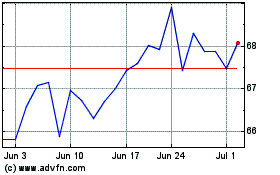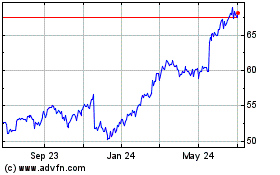By John D. McKinnon, Alex Leary and Kate Davidson
WASHINGTON -- An emerging deal to make China's popular TikTok
app a U.S.-based company stands to reshape the social-media
landscape, even as questions persisted Sunday over security
concerns and ownership of the new company.
The deal -- approved in concept by President Trump this weekend,
but pending final approval by the companies involved -- would
create an online power that could challenge Facebook Inc.'s
dominance in social media and become a template for partnerships
with other Chinese-owned apps.
The plan calls for Oracle Corp. and Walmart Inc. to form
partnerships with TikTok's owner, ByteDance Ltd. of Beijing, to
become a new U.S.-based company called TikTok Global. The Commerce
Department said it would delay for one week a ban on U.S. downloads
and updates for the TikTok app that was set to take effect at 11:59
p.m. Sunday while the new deal for TikTok is finalized by the
companies and investors involved.
Oracle said it would host the data for TikTok Global, to
eliminate the potential of it falling into the hands of the Chinese
government -- a plan that didn't fully satisfy China hawks,
including Sen. Marco Rubio (R., Fla.).
"No matter where the actual data is housed, there can be
something in that code that sends it the other way," Mr. Rubio said
on Fox News. "I think we have to be very careful in looking at that
provision, because if there's any opportunity whatsoever for China
to continue to collect personal data on Americans, then we can't be
supportive of that deal."
Other questions swirled around the ownership. Mr. Trump had
called for creation of a U.S. company to take control of TikTok,
but the deal as described by backers wasn't the full-scale
acquisition that was originally envisioned.
"There's an issue of credibility here," said Harry Broadman, a
former World Bank economist who also worked for the U.S. Trade
Representative during the Clinton administration. "When you have
uncertainty in policy regimes that international parties see, that
makes people very nervous."
As initially described by people familiar with the deal,
ByteDance would retain roughly 80% ownership of the company. But
because ByteDance is about 40%-owned by U.S. investors, the new
company with equity stakes for Oracle and Walmart can be described
as having majority American ownership, they said.
One of the people elaborated further Sunday, saying ByteDance
wouldn't technically be an owner of the new TikTok Global entity.
Instead, shares in the new entity would be distributed
proportionally to ByteDance's current owners, which include both
Chinese and American investors.
With the addition of Oracle and Walmart taking a combined 20%
equity stake, TikTok Global would be 53%-owned by U.S. companies or
investors, this person said.
After an expected initial public offering the Chinese stake in
TikTok could fall to about 31%, depending on exact details of the
size of the IPO, this person said.
The deal is "deftly structured to thread the eye of the needle,"
said Eswar Prasad, an economics professor at Cornell University and
the former head of the International Monetary Fund's China
division.
"The TikTok deal allows Trump to claim victory and portray it as
a validation of his tough, take-no-prisoners approach in dealing
with China, even if the final deal represents a compromise relative
to the administration's initial set of demands," Mr. Prasad
said.
Oracle said in a written statement that it would have a 12.5%
stake in the new entity called TikTok Global, and would provide
secure cloud service for data on the app. Walmart said it had
agreed to purchase 7.5% of TikTok Global as well as entering into
commercial agreements to provide e-commerce, fulfillment, payments
and other services to the new company.
Walmart said its chief executive, Doug McMillon, would serve as
one of five board members of the new company. ByteDance founder
Zhang Yiming and some of the U.S. investors also would likely be on
the board, the people familiar with the deal said.
In a joint statement, Oracle and Walmart said the planned new
TikTok Global would create more than 25,000 jobs in the U.S. and
lead to more than $5 billion in new tax dollars to the U.S.
Treasury.
That statement appeared to address Mr. Trump's initial demand
that the buyers should pay "key money" for the deal to be approved,
which he later said had been blocked by White House lawyers as
illegal.
The companies said the new company would also foster "an
educational initiative to develop and deliver an
[artificial-intelligence]-driven online video curriculum to teach
children from inner cities to the suburbs," without citing a
financial commitment. Mr. Trump had said late Saturday that would
be a $5 billion fund.
A person familiar deal said the education initiative would be
funded through the IPO.
The Chinese government hasn't commented on the latest iteration
of the deal or Mr. Trump's endorsement of it. China's Ministry of
Foreign Affairs and Ministry of Commerce didn't immediately respond
to requests for comment.
ByteDance has been in communication with China's internet
regulator and the Ministry of Commerce on the potential sale,
however, according to people familiar with the discussions.
Still, the forced sale of a piece of one of the world's hottest
internet properties -- China's first true global social-media
sensation -- angered many in China, including Fang Xingdong, a
former internet entrepreneur and founder of Beijing-based think
tank China Labs, who described it in an interview Sunday as
"daylight robbery."
Treasury Secretary Steven Mnuchin played a key role shepherding
a deal that would overcome last-minute hurdles from the Chinese
government, and satisfy ardent China hawks who saw a full sale as
the only way to ensure data security.
As the chairman of the Committee on Foreign Investment in the
U.S., Mr. Mnuchin led the government's review of the proposed
transaction. But he also sought to keep a deal together, working
with U.S. investors and ByteDance executives to help find a
solution that would safeguard U.S. data and avoid an outright ban
of the app in the event a sale fell through or couldn't be
completed in time.
"It doesn't go as far in terms of acquiring the company
outright," said Stephen Pavlick, a policy analyst at research firm
Renaissance Macro, and a former Treasury aide who worked on CFIUS
issues.
"But CFIUS never said that they needed to acquire the company
outright."
Speaking on Fox News, Secretary of State Mike Pompeo said the
ownership arrangement satisfies the president's demand that data
not be accessible to the Chinese government.
"Whether there's still some Chinese ownership where they still
collect a royalty check from the benefits of the business, there
will be an American headquarters, it will be controlled by
Americans," Mr. Pompeo said. "And the data, most importantly, the
data, the very reason we have gone after TikTok, that data will be
in a place that we have confidence that no American will have the
risk that their data will end up in the hands of the Chinese
Communist Party."
TikTok has quickly become a social-media force, a point that
TikTok's lobbyists in Washington made to the Trump campaign, a
senior campaign official said. TikTok has about 100 million monthly
users in the U.S., up from about 11 million in early 2018, and is
mostly popular with teens, including many who are of voting age and
live in key battleground states such as Florida, lobbyists told the
campaign in warning against a ban.
The White House and campaign didn't immediately respond to
requests for comment on whether TikTok's popularity factored into
the White House's decision-making.
The tactic was similar to that employed by opponents of Mr.
Trump's proposed crackdown on flavored e-cigarettes. Vaping
advocates shared with the campaign and White House polling data
commissioned by an industry group, the Vapor Technology
Association, that shows flavored e-cigarettes are popular with
adult consumers in key election states, including Florida, Arizona
and Michigan, and a ban was almost universally opposed.
The Trump administration eventually released a scaled-back
policy, with Mr. Trump saying an outright ban could have dangerous
consequences by pushing vaping underground.
One of the people familiar with the matter said the main
outstanding issues for the U.S. concerned data-security details and
didn't appear substantial. Assuming those issues are resolved,
creation of the TikTok Global entity would proceed over the next
few weeks.
A TikTok spokeswoman said the company was "delighted that the
individuals who've turned their creativity on TikTok into thriving
careers, the small businesses using TikTok to reach customers
during the pandemic, and the families who've found joy and
connection through our platform will be able to use TikTok for many
years to come."
--Georgia Wells and Liza Lin contributed to this article.
Write to John D. McKinnon at john.mckinnon@wsj.com, Alex Leary
at alex.leary@wsj.com and Kate Davidson at
kate.davidson@wsj.com
(END) Dow Jones Newswires
September 20, 2020 17:49 ET (21:49 GMT)
Copyright (c) 2020 Dow Jones & Company, Inc.
Walmart (NYSE:WMT)
Historical Stock Chart
From Jun 2024 to Jul 2024

Walmart (NYSE:WMT)
Historical Stock Chart
From Jul 2023 to Jul 2024
